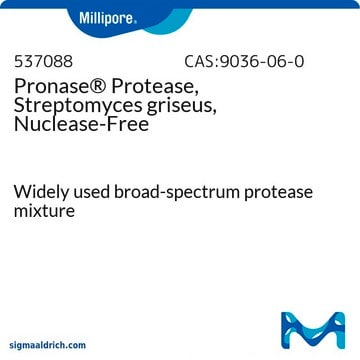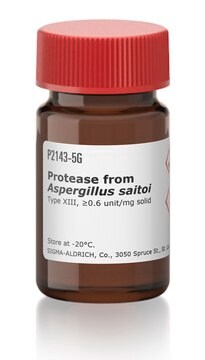53702
Pronase® Protease, Streptomyces griseus
Synonym(s):
Pronase® powder
Sign Into View Organizational & Contract Pricing
All Photos(1)
About This Item
Recommended Products
form
lyophilized
Quality Level
specific activity
≥45,000 proteolytic units/g dry wt
manufacturer/tradename
Calbiochem®
storage condition
OK to freeze
desiccated (hygroscopic)
solubility
water: 10 mg/mL
shipped in
ambient
storage temp.
2-8°C
General description
A non-specific protease liquefies mucins and digests proteins to free amino acids. Can be used to isolate living chondrocytes. Most active at neutral pH, but it is stable over a wide pH and temperature range. Has an optimal pH of 7.5. Note: 1 KU = 1000 units.
A non-specific protease liquefies mucins and digests proteins to free amino acids. Can be used to isolate living chondrocytes. Most active at neutral pH, but stable over wide range of pH and temperature. Note: 1KU = 1000 units.
Note: 1 KU = 1000 units.
Warning
Toxicity: Harmful (C)
Unit Definition
One unit is defined as the amount of enzyme that will liberate a digestion product equivalent to 25 µg of tyrosine per min at 40°C, pH 7.5.
Physical form
Lyophilized from a solution containing calcium acetate as a stabilizer.
Reconstitution
Following reconstitution, store in the refrigerator (4°C). Stock solutions are stable for 24 h at 4°C.
Other Notes
Narahashi, Y., et al. 1968. J. Biochem. 64, 427.
Legal Information
CALBIOCHEM is a registered trademark of Merck KGaA, Darmstadt, Germany
PRONASE is a registered trademark of Merck KGaA, Darmstadt, Germany
Signal Word
Danger
Hazard Statements
Precautionary Statements
Hazard Classifications
Eye Irrit. 2 - Resp. Sens. 1 - Skin Irrit. 2 - STOT SE 3
Target Organs
Respiratory system
Storage Class Code
11 - Combustible Solids
WGK
WGK 2
Certificates of Analysis (COA)
Search for Certificates of Analysis (COA) by entering the products Lot/Batch Number. Lot and Batch Numbers can be found on a product’s label following the words ‘Lot’ or ‘Batch’.
Already Own This Product?
Find documentation for the products that you have recently purchased in the Document Library.
Customers Also Viewed
T E Davis et al.
Infection and immunity, 15(3), 978-987 (1977-03-01)
Enzymes capable of hydrolyzing cell walls of Blastomyces dermatitidis and chemotypes I and II of Histoplasma capsulatum were prepared in the laboratory or obtained from commercial sources. They included chitinases, beta-1,3-glucanases, beta-1,6-glucanase, and Pronase. Monosaccharides and disaccharides of glucose released
Rebecca J Casaday et al.
Journal of virology, 78(24), 13501-13511 (2004-11-27)
Capsid assembly among the herpes-group viruses is coordinated by two related scaffolding proteins. In cytomegalovirus (CMV), the main scaffolding constituent is called the assembly protein precursor (pAP). Like its homologs in other herpesviruses, pAP is modified by proteolytic cleavage and
Yu Zhang et al.
Frontiers in molecular neuroscience, 11, 222-222 (2018-07-14)
During development, immature blood vessel networks remodel to form a simplified and efficient vasculature to meet the demand for oxygen and nutrients, and this remodeling process is mainly achieved via the pruning of existing vessels. It has already known that
Shinya Ishizuka et al.
The Journal of biological chemistry, 291(23), 12087-12104 (2016-04-30)
Depletion of the cartilage proteoglycan aggrecan is one of the earliest events that occurs in association with osteoarthritis. This loss is often accompanied by a coordinate loss in another glycosaminoglycan, hyaluronan. Chondrocytes experimentally depleted of cell-associated hyaluronan respond by switching
Nicole M Templeman et al.
Developmental cell, 54(1), 92-105 (2020-06-17)
Evolutionarily conserved signaling pathways are crucial for adjusting growth, reproduction, and cell maintenance in response to altered environmental conditions or energy balance. However, we have an incomplete understanding of the signaling networks and mechanistic changes that coordinate physiological changes across
Our team of scientists has experience in all areas of research including Life Science, Material Science, Chemical Synthesis, Chromatography, Analytical and many others.
Contact Technical Service














